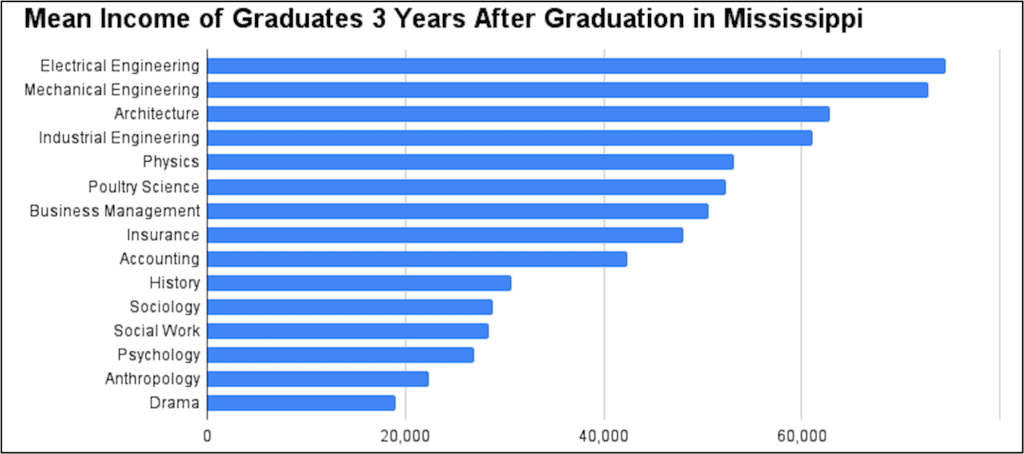Many university degrees produce a negative return on investment, according to a report out this week. Data from the Foundation for Research on Equal Opportunity shows that the cost of many college degrees is not offset by increases in lifetime earnings.
This prompted me to take a look at some separate Mississippi-specific data from the State Workforce Investment Board on graduate earnings. I discovered an extraordinary variance in the future earning potential of different degrees.
Here are the earning averages for fifteen different degree types for Mississippi public universities:

So what? Demand for engineers and insurance professionals is far greater than for actors and anthropologists. Some degrees require more rigor than others.
But then I took a look at data on what happens to Mississippi high schoolers. Approximately 6 in 10 of those that do complete public high school in Mississippi fail to either start any form of college education, or start but fail to complete any kind of college education.
Of those public high school graduates that do go into any kind of post-secondary education, about 1 in 3 drop out.
Pointing out awkward facts about education in Mississippi can be a sensitive subject. Much has been said about the relative improvements in Mississippi’s reading and writing scores in recent years. To be fair, our state is no longer 49th out of 50, but 30-something-or-other.
Great, but the data also shows that only 31 percent of 4th graders were at or above proficiency in reading in 2022. In other words, more than two in three Mississippi 4th graders were not proficient in reading.
The data also shows that a mere 32 percent of 4th graders were at or above math proficiency in 2022. Forgive me if I don’t rush to celebrate a system that fails to produce proficiency for two thirds of public school 4th graders.
In the worst school districts, a student has the odds of achieving proficiency overwhelmingly stacked against them. But even in the best performing school districts – the ones they keep telling us are good – nearly 4 in 10 students are not proficient.
These are the hard facts about public education in our state, and facts do not care about politicians’ feelings. Neither should you if you want to improve the life chances of young people in our state.
Poor proficiency rates in primary education help explain why one in three public high school graduates are dropping out of college education later on.
The underperformance of our education system helps explain the low rate of workforce participation in our state. Unless we acknowledge the underperformance of our education system and address it, we will see our state held back.
If our private school system was producing these kind of outcomes, I suspect politicians would have acted yesterday. Instead, the inconvenient facts are brushed under the carpet.
If we are to change Mississippi for the better, this has to change. Policy makers must not keep going along to get along. That is a recipe for yet more mediocrity.
The time for taking false comfort in marginal improvements is over. The implementation of phonics reading in primary schools might indeed have raised reading standards, but on its own, it is not the strategic change in education we need.
If we want an education system that prepares young people for the life they might live, we need action to ensure:
- Higher standards in the classroom – which means more parent power.
- Ensure more of our high school graduates complete a useful education after high school.
- Allow students to take degrees with better returns on investment, both for the individual student and the state as a whole.
Douglas Carswell is the President and CEO of the Mississippi Center for Public Policy
Read original article by clicking here.

